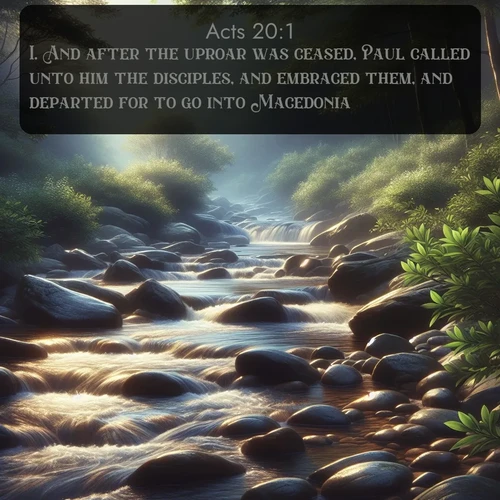Acts 20:1 plusieurs versions / traductions
English Bible Translations
1. And after the uproar was ceased, Paul called unto him the disciples, and embraced them, and departed for to go into Macedonia.
1. And after the uproar ceased, Paul having sent for the disciples and exhorted them, took leave of them, and departed to go into Macedonia.
1. And after the noise had come to an end, Paul, having sent for the disciples and given them comfort, went away from them to Macedonia.
1. But after the tumult had ceased, Paul having called the disciples to [him] and embraced [them], went away to go to Macedonia.
1. And after the uproar had ceased, Paul called to him the disciples, and embraced them, and departed to go into Macedonia.
1. And after the ceasing of the tumult, Paul having called near the disciples, and having embraced [them], went forth to go on to Macedonia;
German Bible Translations
1. Da nun die Empörung aufgehört, rief Paulus die Jünger zu sich und segnete sie und ging aus, zu reisen nach Mazedonien.
1. Nachdem sich aber der Tumult gelegt hatte, ließ Paulus die Jünger zu sich kommen und ermahnte sie; dann nahm er Abschied von ihnen und zog aus, um nach Mazedonien zu reisen.
French Bible Translations
1. Lorsque le tumulte eut cessé, Paul fit venir les disciples [et les encouragea], puis il prit congé d'eux et partit pour la Macédoine.
1. Lorsque le tumulte eut cessé, Paul réunit les disciples, et, après les avoir exhortés, prit congé d’eux, et partit pour aller en Macédoine.
1. Lorsque le tumulte eut cessé, Paul réunit les disciples, et, après les avoir exhortés, prit congé d'eux, et partit pour aller en Macédoine.
1. Or, après que le tumulte eut cessé, Paul fit venir les disciples, et les ayant embrassés, il partit pour aller en Macédoine.
1. Or après que le trouble fut cessé, Paul fit venir les disciples, et les ayant embrassés, il partit pour aller en Macédoine.
1. Après que le tumulte fut apaisé, Paul fit venir les disciples, et leur ayant dit adieu, partit pour aller en Macédoine.
Versions with Strong Codes
Acts 20 / KJV_Strong1. And[G1161] after the[G3588] uproar[G2351] was ceased,[G3973] Paul[G3972] called unto[G4341] him the[G3588] disciples,[G3101] and[G2532] embraced[G782] them, and departed[G1831] for to go[G4198] into[G1519] Macedonia.[G3109]
Strong Code definitions
G1161 de/deh a primary particle (adversative or continuative); but, and, etc.:--also, and, but, moreover, now (often unexpressed in English).
G3588 ho/ho, including the feminine to to in all their inflections; the definite article; the (sometimes to be supplied, at others omitted, in English idiom):--the, this, that, one, he, she, it, etc.
G2351 thorubos/thor'-oo-bos from the base of G2360; a disturbance:--tumult, uproar. see G2360
G3973 pauo/pow'-o a primary verb ("pause"); to stop (transitively or intransitively), i.e. restrain, quit, desist, come to an end:--cease, leave, refrain.
G3972 Paulos/pow'-los of Latin origin; (little; but remotely from a derivative of G3973, meaning the same); Paulus, the name of a Roman and of an apostle:--Paul, Paulus. see G3973
G4341 proskaleomai/pros-kal-eh'-om-ahee middle voice from G4314 and 2564; to call toward oneself, i.e. summon, invite:--call (for, to, unto). see G4314 see G2564
G3588 ho/ho, including the feminine to to in all their inflections; the definite article; the (sometimes to be supplied, at others omitted, in English idiom):--the, this, that, one, he, she, it, etc.
G3101 mathetes/math-ay-tes' from G3129; a learner, i.e. pupil:--disciple. see G3129
G2532 kai/kahee apparently, a primary particle, having a copulative and sometimes also a cumulative force; and, also, even, so then, too, etc.; often used in connection (or composition) with other particles or small words:--and, also, both, but, even, for, if, or, so, that, then, therefore, when, yet.
G782 aspazomai/as-pad'-zom-ahee from G1 (as a particle of union) and a presumed form of G4685; to enfold in the arms, i.e. (by implication) to salute, (figuratively) to welcome:--embrace, greet, salute, take leave. see G1 see G4685
G1831 exerchomai/ex-er'-khom-ahee from G1537 and 2064; to issue (literally or figuratively):-come (forth, out), depart (out of), escape, get out, go (abroad, away, forth, out, thence), proceed (forth), spread abroad. see G1537 see G2064
G4198 poreuomai/por-yoo'-om-ahee middle voice from a derivative of the same as G3984; to traverse, i.e. travel (literally or figuratively; especially to remove (figuratively, die), live, etc.); -depart, go (away, forth, one's way, up), (make a, take a) journey, walk. see G3984
G1519 eis/ice a primary preposition; to or into (indicating the point reached or entered), of place, time, or (figuratively) purpose (result, etc.); also in adverbial phrases:--(abundant-)ly, against, among, as, at, (back-)ward, before, by, concerning, + continual, + far more exceeding, for (intent, purpose), fore, + forth, in (among, at, unto, -so much that, -to), to the intent that, + of one mind, + never, of, (up-)on, + perish, + set at one again, (so) that, therefore(-unto), throughout, til, to (be, the end, -ward), (here-)until(-to), ...ward, (where-)fore, with. Often used in composition with the same general import, but only with verbs (etc.) expressing motion (literally or figuratively).
G3109 Makedonia/mak-ed-on-ee'-ah from G3110; Macedonia, a region of Greece:--Macedonia. see G3110
Prédications qui analysent les thèmes Actes 20
Thèmes : Voyage à Jérusalem; Discours de Paul; Miracle à Troas; Retour à AntiocheActes #23: Le leader biblique est un modèle qui nous fait suivre Christ
Related Sermons discussing Acts 20
Themes : Voyage à Jérusalem; Discours de Paul; Miracle à Troas; Retour à AntiocheActs #23 (Preacher Notes): The Biblical Leader Is a Model Who Makes Us Follow Christ
see also: Bible Key Verses ; KJV Bible Images, BBE Bible images

